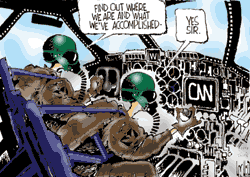 None of us should have any illusions about it. The US-led bombing of Afghanistan is to assuage domestic public opinion in the wake of the devastating 11 September attacks in New York and Washington. The air raids are not supposed to achieve military success-after all, there isn't much left to bomb in the rubble that is Afghanistan. More than 90 percent of Americans until last week favoured military retaliation. What George W Bush has to decide is when the anti-US backlash in soft Islamic states like Pakistan, Uzbekistan or Indonesia gets to be a liability to his country's own geo-strategic interests. Now that the Taliban has made the smart move of allowing in media to film the cruise missile craters, international public opinion will start to turn.
None of us should have any illusions about it. The US-led bombing of Afghanistan is to assuage domestic public opinion in the wake of the devastating 11 September attacks in New York and Washington. The air raids are not supposed to achieve military success-after all, there isn't much left to bomb in the rubble that is Afghanistan. More than 90 percent of Americans until last week favoured military retaliation. What George W Bush has to decide is when the anti-US backlash in soft Islamic states like Pakistan, Uzbekistan or Indonesia gets to be a liability to his country's own geo-strategic interests. Now that the Taliban has made the smart move of allowing in media to film the cruise missile craters, international public opinion will start to turn. But what is it about superpowers like America or regional powers like India that when the nation goes to war, its supposedly free and independent media suddenly goes ballistic with patriotic jingoism? Combined with global satellite and cable, this has the effect of turning wars into programme highlights. Learning the lesson from the Vietnam debacle, Washington is playing the propaganda war through a pliant media, which has made pacifism a dirty word and any talk of finding the root causes of terrorism heresy. As Michael Massing of Columbia Journalism School argued in this paper two weeks ago ("One voice", #63), the US media's one-source treatment of this war is reminiscent of the Soviet Union.
The western media has always reflected the interests and concerns of the western world. That is to be expected. But the trouble is that the western media is the source of news for not just the west, but also the rest of the world. When defeating the Soviets in Afghanistan was in the western interest, the war was interesting for the western media. The Islamic jihad was glorified as a war against the Evil Empire. When the Red Army retreated beyond the Oxus in 1989, the west and western media lost interest in Afghanistan. When the mujahideen started killing each other and destroying Kabul in vicious a fratricidal war, not many foreign journalists were interested even though the carnage was much worse than during the Soviet occupation.
The west's neglect of Afghanistan in the 1990s meant that the country remained in the penumbra of global media. As fundamentalism dug its roots and the Taliban shook its iron fist, the interests of those who fought proxy wars in Afghanistan became limited to seeing it as a transit for Central Asian natural gas. Now that we have concluded Afghanistan is the hotbed of global terrorism, the country is back in the news. The moral double standards of Cold War media coverage continues: just replace Communism with Al Qaida. And the battlefield is still Afghanistan.


